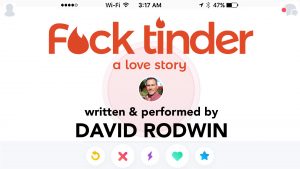By: Winona Young, Zoe Vedova, Gabrielle McClaren
F*ck Tinder: A Love Story

F*ck Tinder is a one man show that centers around David Rodwin’s autobiographical foray into finding love on Tinder as a middle-aged romantic — it is as depressing and as hilarious as you’d think, but even more heart-wrenching.
The play starts off with some tale-as-old-as-time romance — an impromptu breakup. What follows is a crash course on Rowin’s romantic life after he moves cities, and more importantly, downloads the hell out of Tinder. Rowin onstage is sheer charisma with a spotlight; even though he remains onstage alone for a total of 90 minutes, keeping your attention on him isn’t hard at all. Admittedly, Rowin’s humour was initially a little simple to start, poking fun at easy targets about Tinder like fumbling with texting etiquette or throwing in “relatable” convo mishaps. But towards the end, Rowin had the audience laughing about his shenanigans with terrifying date details such as babies brought on, impromptu sexting, polyamorous lovers, and so much more.
By far, what surprised me most about Rowin’s performance was Rowin’s earnest journey towards love itself. I personally thought I would be crying more with laughter than crying out of empathy for Rowin’s truly poignant stories. I remember looking to my friend half-way through the performance, and as Rowin described in loving, careful detail the woman he just met, my friend’s eyes welled up with tears. It’s clear Rowin was a masterful storyteller, and even though he branded his story as a tragic one meant for comedy, it’s clear he is skilled at telling both sorts of story.
I’ll admit — I was skeptical walking into the stage room for this show. With a title as in-your-face as “F*ck Tinder,” with a run time of an hour and a half with only one man onstage, I didn’t have the highest expectations. But the gem that that is “F*ck Tinder” was as rare as actually finding love on Tinder; completely unexpected, and looked so, so much better than their pictures. – WY
Poly Queer Love Ballad

Red Gate Revenue opened their doors (and their gender-neutral bathrooms) to a dark, rainy, Vancouver night; a flood of hipsters, hippies, and sprightly queer people of all ages flowed through the lobby. My girlfriend and I weaved through the current of undercuts, man buns, and musty sweaters saved for special occasions into the packed theatre. With no prior knowledge of the play, I had no idea what kind of theatrical experience I was heading into
Poly Queer Love Ballad, a play conceptualized by actresses Sara Vickruck and Anais West, was brought to life by the hands of their 100% female production crew, and is the well deserving winner of this year’s Fringe New Play prize.
I spent the next hour and 15 minutes clinging to my armrests, taking a lightning bolt of emotion straight to the chest. The play starred two women, three costume changes, one guitar, and one surprise accordion — the performance was intimate, boldly objective, and confoundingly original.
It opened with a catchy song. Engaging guitar riffs, and bright lyrics introduced the audience to Gabby and Nina — Gabby, a monogamous, songwriting lesbian with an affinity for denim vests, and Nina, a polyamorous bisexual slam poetess. The two quickly fall for one another at Vancouver’s own Café Deux Soleils. They’re immediately entangled in relationship turmoil, attempting to balance differing sexual principles around their desire to be together.
The components of the play were calculatedly comfortable. The dialogue was witty and sparse, while still expressing the complexities of being in love — exposing the compromises and agreements people may make when infatuated. Each transition to song or poem felt natural, and helped both expand and solidify the world onstage.
The message about accepting yourself goes beyond coming out to affirm that the process extends through your entire life, evolving as you grow and meet new people. Their message was so incredible to see demonstrated so unpretentiously. The play ran for seventy-five minutes making the onstage relationship slightly rushed, but the unexpected story twists kept the audience laughing and crying for the entire show. – ZV
Macbeth

I read Macbeth in grade 11 and loved it to bits and pieces, so when my friend produced two tickets to see Bard on the Beach’s production, I was immediately onboard. In the car on the way there, she gushed about the production she’d seen already, and we talked about our first encounters with Shakespeare. I mentioned a literary theory my eleventh grade English teacher had said: that the Macbeths had lost a child prior to the events of the play, thus shaping Lady Macbeth’s cruelty and Macbeth’s passivity. My friend went quiet.
As it turns out, Bard’s production took this story and ran with it, exploring the ways that this grief and a couple’s desperate attempts to fill the void left by a child’s death give the play a completely different tone. The plot didn’t change in any way, nor did the words. But my gosh, did they take on different meanings and life.
The brutality of Lady Macbeth (Moya O’Connell) and her pivotal descent into madness makes so much sense, not to mention that O’Connell was a powerhouse, and impossible to look away from. Macbeth’s (Ben Carlson’s) fragility, his compliance in playing Lady Macbeth’s game, his grief in Act V, and his obsession with Banquo and MacDuff’s legacy finally made sense to me. Andrew Wheeler made me care for MacDuff in a way I never really had before — his performance was revealing on the ways MacDuff acts out in paternal protection and grieving, and even mirrors Macbeth in interesting ways.
With this fresh production under the night sky, featuring actors who let the story consume them whole, was the kind of show Shakespeare would have wanted. The three witches also deserve a shoutout for being a) the three witches, and b) so unsettling yet fun to watch.
A week after seeing the play, my stomach still twists, but the production was fantastic on so many levels. The set design was amazing, made almost entirely out of wood, and so intelligently designed. I particularly liked the way that it enabled the final battle to look full, dynamic, and absolutely enormous. What’s more, the palace gates and balcony frame this little piece of sky which got darker and darker as the play went on, and got darker and darker itself which was wicked cool.
The costumes were just beautiful, so much so I sometimes lost bits of dialogue by getting fixated on the subtle tartan, the belts and buckles on someone’s clothes. The use of drums and bagpipes were also a good and unique reminder of setting, without being so frequent and overbearing that the whole Scotland shtick got irritating.
Overall, I would tell you to see this performance, but alas poor Yorick, I went on closing night. So instead, I recommend that you take the time to go to Bard on the Beach next summer. You will not regret it. – GM




